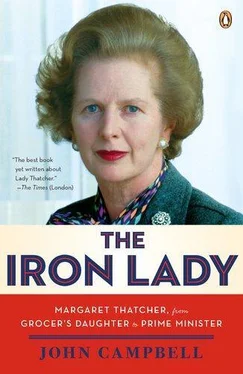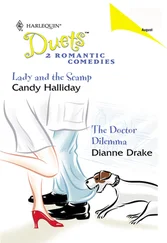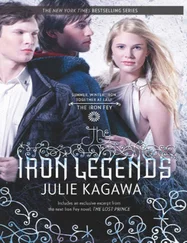Once adopted, Margaret threw herself into the constituency with total commitment. Though she could not seriously hope to win, she had been given an unexpected chance to make her name. She had at most fifteen months before the election to make an impact. First of all, though, she had to move nearer the constituency. So long as she was living and working in Essex she had a very awkward journey into London and out again to get to Dartford. But she could not afford to give up her job with BX Plastics until she had found a more convenient replacement; and this was not easy. She had several interviews, but found employers understandably reluctant to take on someone who made no secret of her political ambitions. Eventually she was taken on by the food manufacturers J. Lyons as a research chemist, working in Hammersmith.The job has usually been described as testing ice cream and pie-fillings, but Lady Thatcher writes in her memoirs that ‘there was a stronger theoretical side to my work there, which made it more satisfying than my position at BX had been’. 6Be that as it may – she was never very interested in theory – she stayed in pie-fillings scarcely longer than she had in plastics: less than two and a half years.
Three months after her adoption she was able to move to Dartford, where she stayed with a local Tory couple. For the next few months her routine was punishing. Commuting to London every day meant getting up before six to catch a bus to the station, a train to Charing Cross, then another bus to Hammersmith; the same in reverse when work finished, followed by an evening of canvassing or meetings, chauffeured around the large constituency by a rota of members; and, finally, speechwriting or other political homework late into the night. It was at this time in her life that she discovered, or developed, the ability to manage on only four hours’ sleep.
But Margaret Roberts was having more fun than she had ever had in her life before. She was in her element. She was busy, she had a mountain to climb and she was the leader. She led from the front, by exhortation and tireless example, and she was the centre of attention: not only local attention, but the first stirrings of national attention, drawn by the still-novel spectacle of a young woman hurling herself into politics. By sheer energy and enthusiasm she pulled a moribund constituency party up by its bootstraps.
Attlee called the General Election, exceptionally, in the middle of winter. Polling day was 23 February; the campaign was fought in miserably cold, wet weather. Miss Roberts’ energy, tackling a solid Labour stronghold in these conditions, won universal admiration. Whether or not she really believed it, she managed to persuade her supporters that she had a real chance of winning.
She fought on the slogan, unveiled at her formal adoption meeting on 3 February, ‘Vote Right to Keep What’s Left’ – six words which brilliantly encapsulated her message, simultaneously identifying the Conservatives with morality and Labour with ruin and decline. Of course she sounded the same themes as other Tory candidates up and down the country, urging lower taxes, lower public spending and incentives to enterprise in place of rationing and controls. But she expressed these routine prescriptions with unusual fundamentalism. Hayek may have been in her mind as she painted the election as a choice between two ways of life – ‘one which leads inevitably to slavery and the other to freedom’.While other Conservatives – particularly those who had been in the war – were anxious to blur such sharp distinctions, accepting that 1945 had shifted the political argument permanently to the left, Margaret Roberts made no such concession:
In 1940 it was not the cry of nationalisation that made this country rise up and fight totalitarianism. It was the cry of freedom and liberty. 7
Of course, she did not win, yet such was the enthusiasm of her campaign that her agent persuaded himself that she had an even chance. In reality the mountain was far too steep for her:

But Miss Roberts had cut Dodds’ majority by a third and won herself golden opinions. After such a successful blooding there could be little doubt that she would get a winnable constituency before long. Her problem was that nationally the Conservatives had almost, but not quite, overturned Labour’s 1945 majority. Attlee survived with an overall majority of just five. This meant that there was likely to be another election very soon, making it difficult for candidates like Margaret Roberts to seek greener pastures.
Margaret Roberts’ first parliamentary campaign must have done wonders for her self-confidence. She knew now that she was on her way.With her course firmly set, she could begin to equip herself professionally for the career that lay within her grasp. Testing pie-fillings was no preparation for the House of Commons. As soon as the 1950 election was out of the way she applied to the Inns of Court to start reading for the Bar. She gave up her digs in Dartford and rented a flat in Pimlico. Instead of commuting daily to Hammersmith and returning to Dartford every evening to canvass, she could now devote her evenings to the law, visiting the constituency only when required. She did not really believe that one more push would win it. Yet she was still more visible than most candidates in hopeless seats.
Living in London also enabled her to see more of Denis Thatcher, who drove down to Atlas Preservatives each day from Chelsea. Since their first meeting on the night of her adoption, their relationship had developed slowly. Margaret had little time for social life in the eleven months up to the election; moreover, they were commuting every day in opposite directions. It was ‘certainly not’, she later insisted, love at first sight. 8
Margaret and Denis were not an obviously well-matched couple: they had very few interests or enthusiasms in common. Yet at the time they met each was exactly what the other was looking for. Denis was thirty-three in February 1949. He had been deeply hurt by the failure of his first marriage. He wanted to marry again before he got too old, but was wary of making another mistake. What he liked about Margaret Roberts, on top of her looks, her energy and her youthful optimism, was her formidable practicality. She was not a girl who was going to make a mess of her life, or complicate his with feminine demands. Dedicated to her own career, she would leave him space to get on with his. She too was ready to get married, on her own terms. Hitherto she had never had much time for boyfriends. She had male friends – indeed, she preferred the company of men to women – but they were political associates with whom she talked and argued, rather than kissed. She always preferred men older than herself.
Though she had made a great impact in Dartford as a single woman, Alfred Bossom – leader of the Kent Conservatives and something of a mentor at this time – advised her that to advance her career she really should be married. Moreover, in sheer practical terms, marriage would enable her to give up her unrewarding job and concentrate fully on law and politics.
At the same time her practicality disguised a romantic side to her nature. At the height of her political power Mrs Thatcher was notoriously susceptible to a certain sort of raffish charm and displayed a surprising weakness for matinee-idol looks. Denis did not have these exactly, but he was tall (which she liked), upright and bespectacled (like her father, though Denis was more owlish). He had fought in the war and retained a military manner, at once slangy, blunt and self-deprecating. As managing director of his family firm he was comfortably off, drove a fast car and had his own flat in Chelsea. In the still grey and rationed world of 1950 he had, as she writes in her memoirs, ‘a certain style and dash… and, being ten years older, he simply knew more of the world than I did’. 9But she would not have fallen for a playboy. It was his work that took Denis round the world, and she admired that. She was a great believer in business, and export business in particular. Atlas Preservatives was just the sort of company on which British economic recovery depended. Beneath his bluff manner, Denis was a serious businessman of old-fashioned views and a moral code as rigorous as her own. He was much more relaxed about politics than she was, but he shared her principles and embodied them in practice. It was not an accident that politics brought them together.
Читать дальше













